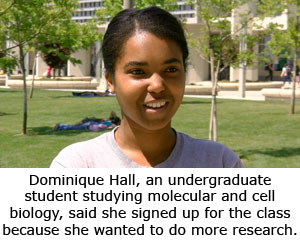

As biology Professor
Carolin Frankput it, her undergraduate genomics students last year didn’t do cook book lab experiments.
Instead of following instructions that will lead to a certain result, the 20 students worked on the U.S. Department of Energy’s Joint Genome Institute’s project to annotate the genome of a particular bacterium.
Frank was accepted as a faculty collaborator in the “Adopt a Genome Program” late last year, allowing the students to annotate the genome of atopobium parvulum, a bacterium commonly found in a person’s mouth. Many bacterial genomes have been annotated, though significant holes remain. The genome of atopobium parvulum was sequenced as a part of a project called GEBA (The Genomic Encyclopedia of Bacteria and Archaea), meant to fill in gaps of the tree of life and increase knowledge about microbial genome complexity.
UC Merced’s involvement is an example of the hands-on learning experiences available to undergraduates. The
researchwill continue in the Fall 2010 semester.
“The students are actually looking at a gene for the first time,” Frank explained. “No one has looked at it before. It’s up to them to predict the function of the gene. It’s real.”
The Department of Energy is advancing genomics to support its missions related to clean energy generation and environmental characterization and cleanup. The University of California operates the institute for the Department of Energy.
Each student in the class was assigned a segment of the genome to annotate using a computer.
Dominique Hall, an undergraduate student studying
molecular and cell biology, said she signed up for the class because she wanted to do more research that involved computational biology.
“The things we learn in lecture we can really use in the lab,” she explained. “It’s different than anything else I’ve done.”
Ashley Graham, who’s also majoring in molecular and cell biology, said annotating was relatively easy because she knew what to look for within the genome. The challenging part is drawing meaningful conclusions.
She said the lab increased her confidence, helped her understand what it’s like to be a scientist and cemented her desire to pursue molecular and cell biology.
“It’s a different way of looking at the world,” she said. “It’s trying to solve problems. It’s trying to be innovative.”






